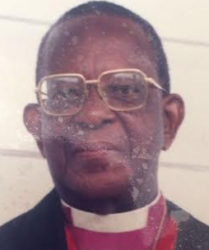The Guyana Human Rights Association (GHRA) has lauded the role played by the late Bishop Randolph George in fighting oppression.
According to a release from the GHRA, the Bishop’s leadership of civic resistance to oppression in Guyana from the late 1970s to the early 1990s was pivotal and historic. He showed notable political courage in defending trade union demonstrations and denouncing political actions against them during the late 1980s, the release added.

It said that the Bishop was one of the first trios of Co-Presidents of the GHRA, and was unwavering during the late `70s and `80s in his willingness to be the voice of the voiceless in an era of rationed newsprint, seized publications, disabled gestofax machines, raided printing enterprises and non-existent private radio or television, the release stated.
Another major contribution made by the Bishop, the release stated, was the leadership he provided in the struggle for free and fair elections.
“His role in the Guyanese Action for Reform and Democracy (GUARD) consolidated his stature as a trusted national figure whose influence reached well beyond the religious and civic community, without the slightest inclination on his part to seek leadership or the limelight. His influence as a unifying figure across the ethnic divide derived from inclination and instinct for what was right and decent and a genuine interest in everyone he came into contact with. Moreover, as a result of constant trekking across the interior visiting Anglican communities over the years, the number of Amerindians he knew by name was extraordinary.”
The notable contributions made by George to defend human rights violations were rooted in freedom of expression, the independence of the courts and countering abuses generated by the paramountcy of the ruling party, the release stated.
The release conveyed sympathies to his widow Sheila, their family and the Anglican community. Bishop George passed away on Monday at the age of 92.





